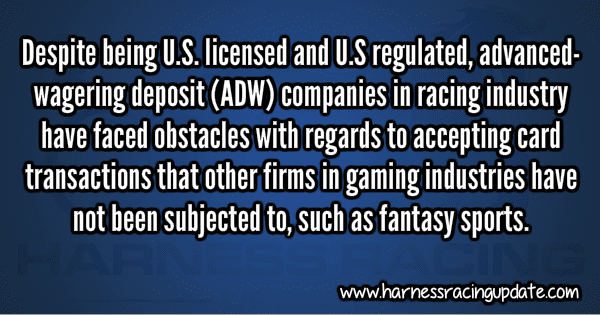

New credit card transaction rules should benefit industry
by Brett Sturman
For horseplayers who wager online, funding a wagering account can sometimes be as difficult as picking actual winners.
Despite being U.S. licensed and U.S regulated, advanced-wagering deposit (ADW) companies in racing industry have faced obstacles with regards to accepting card transactions that other firms in gaming industries have not been subjected to, such as fantasy sports.
That could all be about to change.
Card transactions for horse racing fall under a particular credit card code that identifies those types of transactions as more high risk, and until now for at least one bank, were treated differently than other types of gaming transactions.
Earlier this week the National Thoroughbred Racing Association (NTRA) announced that JPMorgan Chase has begun approving credit card transactions assigned the horse racing code with ADWs provided they are a licensed and regulated U.S. company (and provided that a player is operating out a state where such wagering is legal). This is significant because Chase represents the largest credit card issuer in the U.S.
We could certainly debate separately from a responsibility standpoint if players should be allowed to fund accounts through credit cards at all – but to be clear – the issue for horseplayers this entire time wasn’t restricted to only credit cards. As I can attest, debit cards (cards linked directly to bank accounts) have also been restricted at times provided they were issued by a bank that blocks such transactions.
The problem has been that with any type of card transactions being subject to declines, it makes it difficult to fund accounts and by obvious extension, bet races online and contribute to race handle. Some ADWs allow people to deposit into an account directly through a checking account, but especially in today’s world it’s understandable that people are leery of providing their banking information out in cyberspace.
Some speculate that the Chase decision could be a testing of the waters for what may be to come in terms of a national legalized sports betting. But whatever the reason, a less restrictive stance being adopted by Chase is welcome news for both the ADWs and for the racing industry.
While not as large as industry titans such as Twin Spires, TVG or Xpressbet, the advanced-deposit wagering company Day At The Track, Inc. (DATT) provides wagering for all harness tracks in North America with the exception of those owned by Churchill Downs and Rosecroft, which is owned by the Stronach Group.
Regarding the challenges that his company has felt with the restrictive card transaction guidelines, DATT co-founder and CEO Shawn Egide said, “In the past it required companies like us and others in the ADW space to work with other organizations to come up with alternative payment processing methods. And some of those methods were costlier for both us and the player, and would require two or three extra steps to execute the transaction to finally get money into your tote account. What’s going to happen now is that it’ll be a much more straightforward process for a player to get money into their tote account. And not only with Chase, but some of the other bigger banks may follow suit in a short time as well.”
The issue of being able to fund player accounts not only is an obvious issue for the ADW but subsequently for racing handle, as noted previously. Said Egide, “(Card transaction restrictions) dramatically restricted growth opportunities, because the most critical option is being able to fund your account. There’s a lot of people who if they can’t just jump on and use their credit card or debit card like they do with any other transaction that they do on the web won’t fund their account. They just aren’t interested in paying the extra fees, or they’ll wager less because they have to use fees to fund through alternative methods.”
As someone who has frequented a number of different ADWs through the years, I’ve been attracted to those that in part have been the most convenience to fund. To me, it’s not worth the hassle to either pay fees or leave home in order execute some other type of payment method.
From what Egide has seen, it’s the same thing. “Some of the alternative methods entail going out to the store whether it’s a PayNearMe or a Greendot, so it takes the player extra time to fund. Any time you make something a more cumbersome process to perform a transaction you’re definitely not going to get as much volume as you would no matter what business you are in.”
It remains to seen just how much of an impact that the Chase decision will have but it appears to be a no-brainer win for the racing and harness industry.
“Right now Visa cards were showing approval rates of just 35-40 per cent and even less on Mastercard,” Egide said. “So, these big banks – the largest 8 banks control an overwhelming majority of all card transactions – it may not be long for other banks follow suit from Chase. And then all the sudden you’re talking about it being much easier for people to make transactions and get money into their accounts, and that’s going to be significant for everyone.”
In its announcement, the NTRA hailed the Chase decision as a win for the industry and for all the reasons stated, they are absolutely correct. Those who may have been turned off from wagering online through an ADW because of previous difficulties may now find the process not as challenging. And as a result, pari-mutuel handle in both thoroughbred and harness racing will be reflective of it.















